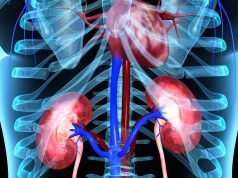One-time CKD screening at age 55 years had incremental cost-effectiveness ratio of $86,300 per QALY gained; other options were also cost-effective
By Elana Gotkine HealthDay Reporter
MONDAY, May 22, 2023 (HealthDay News) — Screening adults for albuminuria to identify chronic kidney disease (CKD) could be cost-effective, according to a study published online May 23 in the Annals of Internal Medicine.
Marika M. Cusick, from Stanford University in California, and colleagues examined the cost-effectiveness of adding population-wide screening for CKD, with or without adding sodium-glucose cotransporter-2 (SGLT2) inhibitors to the current standard of care.
The researchers found that in the base-case analysis, one-time screening at age 55 years had an incremental cost-effectiveness ratio of $86,300 per quality-adjusted life year (QALY) gained, which resulted from increasing costs from $249,800 to $259,000 and increasing QALYs from 12.61 to 12.72; this was accompanied by a 0.29-percentage point reduction in the incidence of kidney failure requiring dialysis and an increase in life expectancy from 17.29 to 17.45 years. Other options were also found to be cost-effective. Screening once during ages 35 to 75 years prevented dialysis or transplant in 398,000 people and screening every 10 years until age 75 years cost <$100,000 for each QALY gained. In sensitivity analyses, when SGLT2 inhibitors were 30 percent less effective, the cost of screening every 10 years during ages 35 to 75 years was between $145,400 and $182,600 per QALY gained; for screening to be cost-effective, price reductions would be required.
“We found that both one-time and periodic screening for CKD represent good value in every age group when SGLT2 inhibitors are included in treatment,” the authors write.
Copyright © 2023 HealthDay. All rights reserved.








